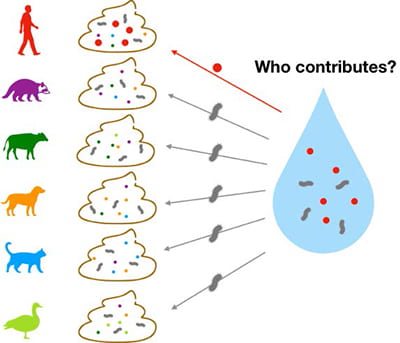Development of Indicators for Human Fecal Pollution Using Deep-Sequencing of Microbial Communities

Shuchen Feng’s work was focused on expanding the view of human-associated fecal organisms using deep sequencing of sewage and animal fecal microbial communities. Dr. Feng developed highly specific and sensitive qPCR assays to increase the accuracy of microbial source tracking of human fecal contamination.
Human fecal pollution is a persistent issue of microbial water quality in the U.S. and worldwide. Over the past two decades, microbial source tracking (MST) methods have been developed to identify the presence of human-associated fecal microorganisms. The standard approach is to use quantitative polymerase chain reaction (qPCR) assay to amplify distinct sequences (i.e., markers) of these microorganisms that serve as fecal indicators. To date, most bacterial human fecal marker assays are limited to the genus Bacteroides, leaving a large fraction of fecal microorganisms unexplored. Furthermore, specificities and sensitivities of these assays are negatively affected by animal cross-reactions and varying Bacteroides abundances in the host sources, respectively. My work has been focused on expanding the view of human-associated fecal organisms using deep sequencing of sewage and animal fecal microbial communities. Multiple human-associated alternative indicators were selected from family Lachnospiraceae. Indicators within the genus Bacteroides that were uniquely present in urban sewer infrastructure, but not human or animal gut microbiomes were also identified. Subsequently, qPCR assays were developed for their practical applications to track human fecal source. In addition, mechanisms for low-level animal cross-reactions were explored, further demonstrating host specificities of these new indicators.
